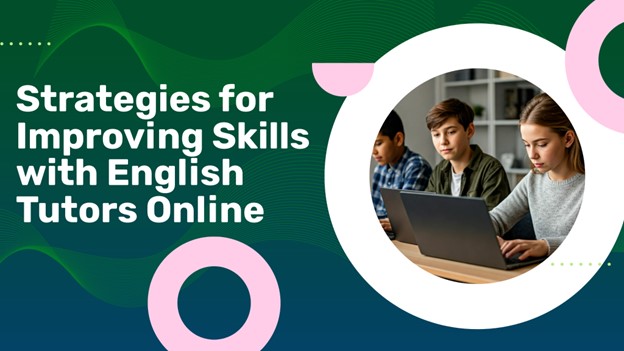In today’s interconnected world, mastering English has become more crucial than ever. Whether you’re aiming to advance your career, broaden your horizons, or simply communicate more effectively, online English tutors offer a flexible and personalized path to fluency. But how can you make the most of this digital learning experience? Let’s dive into proven strategies that will supercharge your English skills and maximize your time with online tutors.
1. Maximizing Your Time with an Online Tutor
Set Clear, Specific Goals
Set clear goals for yourself before your first session. You might be preparing for a job interview in English or aiming to write more engaging academic papers. Perhaps you feel that traveling around will require much more confidence when speaking with native speakers.
Pro tip: Break your larger goals into smaller, manageable steps. Instead of the overall improvement, set weekly and monthly goals for scoring in each section of the IELTS.
Engage Actively in Every Session
Gone are the days of passive learning. To truly excel, you need to be an active participant in your online English lessons. Here’s how:
- Ask questions: Don’t hesitate to seek clarification on anything you don’t understand.
- Offer examples: When learning new vocabulary or grammar structures, try to create your sentences.
- Challenge yourself: Request more complex tasks as you progress.
Follow-Up: The Secret Sauce of Success
The learning doesn’t stop when your tutor logs off. To cement your progress:
- Review your notes: Immediately after each session, go through what you’ve learned.
- Practice independently: Use resources to reinforce new concepts.
- Prepare questions: Jot down any queries that arise for your next session.
2. Leveraging Personalized Feedback
Embrace Constructive Criticism
One of the biggest advantages of tutors online is the real-time, personalized feedback you receive, which helps target specific areas for improvement, such as pronunciation, grammar, and fluency. This immediate feedback allows you to correct mistakes as they happen, helping to reinforce correct language usage.
One of the primary strategies is to set clear, measurable goals for each session, whether it’s improving vocabulary, mastering grammar, or practicing pronunciation. Consistent practice with a tutor can help you gain confidence and refine your skills over time. When seeking to enhance your language abilities, working with english tutors online can offer a flexible and effective solution.
Additionally, many online tutors can track your progress over time and adapt lessons to your evolving needs, ensuring consistent growth. By addressing weaknesses promptly, you can achieve faster progress and greater confidence in using the language in real-world contexts.
- Be open-minded: View corrections as opportunities, not criticisms.
- Take notes: Record the feedback you receive to track patterns in your mistakes.
- Apply immediately: Try to use the corrected form right away in your conversation.
Eye-opening stat: Studies show that immediate feedback can increase student performance. It’s like having a personal language coach guiding your every step.
The Power of Self-Assessment
While tutor feedback is invaluable, developing your self-assessment skills can accelerate your progress:
- Record yourself: Use voice memos or videos to capture your English practice.
- Listen and analyze: Pay attention to your pronunciation, fluency, and grammar.
- Compare with native speakers: Find similar content from native English speakers and note the differences.
3. Implementing Interactive Learning Tools
Harness the Power of Language Apps
Take learning time beyond the hours of your tutor. For maximum efficiency in learning, go ahead and enrich your vocabulary with the best option for digital tools for giving words a more efficient pour down of that lexicon.
Internet tools also provide measurable chunks of grammar exercises to carry that away and become a master of grammar rules. Make use of pronunciation tools with speech recognition technology that will smoothen and perfect your accent for clear expression.
Dive into Virtual Conversations
Expand your horizons beyond one-on-one tutoring:
- Language exchange platforms: Connect with native speakers online.
- Online forums: Participate in discussions in English.
- Virtual meetups: Join English conversation groups online.
4. Incorporating Diverse Learning Methods
Immerse Yourself in English Media
Try to immerse yourself as much as possible in the language. First of all, watch films, TV shows, or videos using subtitles to get accustomed to many of the accents and expressions. Listen every day, listen to topics of interest for you.
This way, you will listen more and expand your knowledge. Read some materials, be it news articles or novels. This will go a long way to helping with your vocabulary and knowledge.
Speak, Speak, and Speak Some More
Practice makes perfect, especially when it comes to speaking:
- Shadow native speakers: Repeat phrases from videos or podcasts to improve pronunciation.
- Narrate your day: Describe your daily activities in English, even if just to yourself.
- Teach what you’ve learned: Explaining concepts to others reinforces your understanding.
5. Overcoming Common Learning Challenges
Consistency is Key
One of the biggest hurdles in language learning is maintaining a consistent practice routine. Here’s how to stay on track:
- Set a schedule: Dedicate specific times for English practice, just like any other important appointment.
- Use reminders: Set alerts on your phone to prompt daily English activities.
- Track your progress: Use a language learning journal to monitor your consistency.
Remember: Progress compounds over time. Even 15 minutes of daily practice can lead to significant improvements over weeks and months.
Building Confidence
Feeling nervous about speaking English? You’re not alone. Try these confidence-boosting strategies:
- Start small: Practice with supportive friends or in low-pressure online communities.
- Celebrate victories: Acknowledge every successful interaction, no matter how small.
- Reframe mistakes: View errors as learning opportunities rather than failures.
Encouraging fact: Most native English speakers appreciate the effort of language learners and are more than willing to help. Your willingness to try often matters more than perfect grammar.
The Road to English Mastery: A Comparison
Let’s look at how different approaches to online English learning stack up:
| Aspect | Traditional Online Tutoring | Enhanced Strategy with Our Tips |
| Goal Setting | General improvement | Specific, measurable objectives |
| Engagement | Passive listening | Active participation and questioning |
| Feedback | Generic corrections | Personalized, actionable feedback |
| Practice | Limited to session time | Continuous, multi-platform engagement |
| Tools Used | Basic video calls | Interactive tools, media immersion |
| Speaking Practice | During sessions only | Daily practice with various methods |
| Progress Tracking | Tutor assessments | Self-assessment and regular insights |
| Confidence Building | Gradual | Accelerated through varied interactions |
As you can see, implementing these strategies can significantly enhance your online English learning experience, leading to faster progress and more sustainable results.
Conclusion: Your Path to English Fluency
You will be guided by online tutors and further enhance your English capabilities with great commitment, smart work, and effort, leading to full bloom with well-defined goals and ample absorption of lessons, using personalized feedback and mastering techniques for gaining fluency in learning. Remember, each word learned, every single conversation practiced, and every hurdle crossed by you brings you closer to being fluently conversational in English.
FAQs
- How often can I take online sessions with my English teacher?
It all depends upon your goals and schedule, but at least 2-3 sessions per week combined with daily self-study will make it count.
- What can I do if I feel nervous speaking English during my tutoring?
Start with text-based chats if possible and then you can gradually proceed towards voice calls. Let your tutor know about your nervousness, he/she may alter their approach and make you feel better.
- How does one measure one’s improvement in English learning?
Monitor your development by means of frequent periods of self-assessment, language learning journal, and demands from your tutor for regular evaluation.

